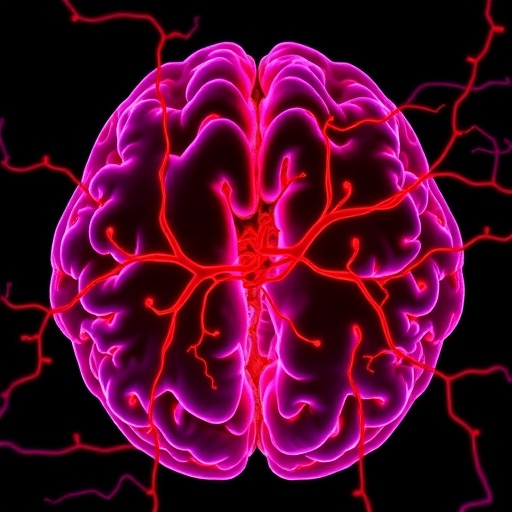Tau protein has long been implicated in the characteristic neurofibrillary tangles found in Alzheimer’s disease, predominantly associated with neuronal damage and cognitive decline. However, recent histopathological observations have detected accumulations of tau aggregates not only within neural tissue but distinctly localized along the cerebrovascular endothelium. This vascular tau deposition has eluded mechanistic understanding until now, with early vascular changes increasingly recognized as precursors to symptomatic dementia. The current study elucidates how fibrillar, protofibrillar tau species alter cerebral endothelial cell function at a molecular level, driving a cascade of vascular dysfunction instrumental in disease progression.
To dissect this phenomenon, researchers developed an in vitro model mimicking the neurovascular unit’s endothelial barrier, exposing these cells to protofibrillar tau extracted to replicate early-stage Alzheimer’s pathology. The experiments revealed that tau exposure induces a metabolic shift within endothelial cells, specifically modulating glycolytic activity and mitochondrial function. This energy reprogramming is accompanied by an upregulation of pro-inflammatory gene pathways and endothelial activation markers, culminating in increased barrier permeability. The consequence is a breach in the BBB, allowing potentially neurotoxic substances and peripheral immune cells to infiltrate the brain parenchyma, thereby exacerbating neuroinflammation and neuronal injury.
Significantly, the metabolic switch induced by tau involves heightened glycolysis—a phenomenon reminiscent of metabolic adaptations seen in other inflammatory and pathological contexts. This glycolytic induction appears to be an early event, occurring rapidly after tau exposure and preceding overt barrier compromise. Such metabolic reprogramming not only serves as a mechanistic driver of endothelial dysfunction but also presents a potential therapeutic target to restore BBB integrity before irreversible neurodegeneration unfolds. The identification of this early metabolic alteration is poised to shift the paradigm of Alzheimer’s research toward neurovascular intervention strategies.
The in vitro findings were corroborated by in vivo studies using tau transgenic mice engineered to accumulate human tau aggregates akin to Alzheimer’s pathology. Examination of these animals’ cerebrovascular architecture showcased hallmark changes consistent with tau-mediated endothelial injury, including amplified inflammatory responses and diminished tight junction protein expression integral to BBB maintenance. These vascular pathologies parallel the metabolic disturbances observed in cultured cells, reinforcing the concept that tau-induced endothelial dysfunction is a foundational event in the Alzheimer’s disease cascade.
Importantly, this study delineates the heterogeneity of tau species, focusing on protofibrillar forms that are thought to develop prior to the formation of insoluble neurofibrillary tangles. The research suggests that these intermediate aggregates exert potent and deleterious effects on cerebrovascular cells, in contrast to fibrillar forms traditionally associated with neuronal damage. By pinpointing this specific tau conformation, interventions can be tailored to intercept early-stage tau toxicity, targeting the neurovascular interface to prevent subsequent neurodegenerative outcomes.
The weakening of the BBB due to tau-driven endothelial pathology signifies not only physical barrier disruption but also the loss of critical neuroprotective functions. The BBB’s role extends beyond a mere physical blockade; it actively regulates nutrient transport, waste clearance, and immune surveillance. Tau-mediated impairment compromises these processes, fostering a pro-inflammatory brain milieu conducive to progressive neuronal loss. Thus, vascular contributions to cognitive impairment and dementia (VCID) gain substantial credence, with tau pathology serving as a molecular nexus linking neurodegeneration and vascular dysfunction.
Looking forward, the research team is delving deeper into the mechanisms of tau internalization by endothelial cells and the signaling pathways precipitating glycolytic upregulation. Moreover, investigations aim to elucidate tau’s effects on other constituents of the neurovascular unit, particularly glial cells such as astrocytes and pericytes, which synergistically maintain BBB homeostasis. Disentangling this complex cellular interplay is essential to comprehensively understand and therapeutically target neurovascular degeneration in Alzheimer’s disease.
This study marks a significant leap in Alzheimer’s research by highlighting a non-neuronal, vascular dimension of tau pathology. It propels the field toward early detection and treatment paradigms centered on preserving BBB function to forestall cognitive decline. Targeting metabolic and inflammatory pathways within cerebral endothelial cells presents a promising avenue for novel therapeutics, potentially altering the trajectory of Alzheimer’s and similar dementias before irreversible damage ensues.
The implications for clinical translation are profound, fostering a new generation of diagnostic biomarkers sensitive to neurovascular dysfunction and endothelial metabolic changes induced by tau. Such biomarkers could enable earlier intervention windows and tailored treatment modalities. Furthermore, understanding tau’s vascular effects may unlock insights into overlapping pathologies such as cerebral amyloid angiopathy and other forms of vascular dementia, broadening the impact of these findings.
In summary, the intricate relationship between pathogenic tau species and cerebral endothelial metabolism illuminates a critical axis of Alzheimer’s disease progression. By disrupting energy homeostasis and promoting inflammatory activation, tau compromises the blood-brain barrier’s protective functions, opening new vistas for exploring therapeutic strategies to maintain cerebrovascular health and cognitive integrity.
Subject of Research: The pathological effects of protofibrillar tau on cerebral endothelial cell metabolism, vascular inflammation, and blood-brain barrier integrity in Alzheimer’s disease.
Article Title: Fibrillar tau alters cerebral endothelial cell metabolism, vascular inflammatory activation, and barrier function in vitro and in vivo.
News Publication Date: 20-Mar-2025.
Web References:
Alzheimer’s & Dementia – DOI: 10.1002/alz.70077
Keywords
Alzheimer disease, Human brain, Blood vessels, Blood brain barrier, Tau proteins, Memory formation, Inflammation, Discovery research, Molecular mechanisms, Neural mechanisms, Academic researchers, Academic journals, Cell pathology, Human health
Tags: blood-brain barrier integritycerebral vascular defensesendothelial cell dysfunctionhistopathological observations in Alzheimer’sinflammatory cascades in Alzheimer’smechanisms of Alzheimer’s progressionneurodegenerative conditionsneurovascular model researchtau aggregates and cerebrovascular healthtau protein Alzheimer’s diseasetau’s role beyond neuronsvascular pathology in dementia





